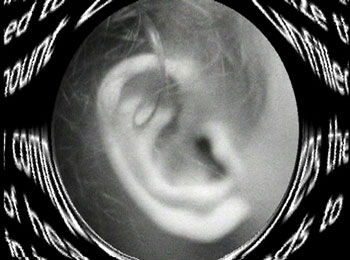|
Leslie Thornton
Refracted
through archival and "found" footage, texts and soundtracks,
Leslie Thornton's rigorously experimental film and video work is an
investigation into the production of meaning through media. For
Thornton, form and content are co-extensive, as exemplified by her epic
project, Peggy and Fred in Hell, an ongoing cycle of interrelated films,
videos and installation environments focusing on two children who have
been "raised by television." Heterogeneous and open-ended,
the series defies conceptions of
masterwork, author, and the strictures of beginning, middle, and end.
This
resistance to categorization is informed by Thornton's concerns with
language, and her view of media as a linguistic system that is ideologically
coded and subject to the controls of culture and the market. Her works
are interventions on contested terrain, in which the stakes are conventions
of reading and writing, legibility and transparency. For Thornton, the
conventions of narrative and montage must not simply be renounced, but
used
as tools against themselves. The
result is a unique and strangely beautiful syntax, one that poses
its critique at the same time that it mesmerizes, confounds, and provokes.
Thornton writes, "I see myself as writing with media, and I position
the viewer as an active reader, not a consumer. The goal is not a product,
but shared thought."
Leslie
Thornton was born in 1951 in Knoxville, Tennessee. She studied with
filmmakers Hollis Frampton, Stan Brakhage, Paul Sharits and Peter
Kubelka at the State University of New York/Buffalo, and with Richard
Leacock and Ed Pincus at MIT. She has been honored with numerous awards,
including the
Maya Deren Award, the first Alpert Award in the Arts for media, a nomination
for the Hugo Boss Award, two Rockefeller Fellowships, and grants from
the
National Endowment for the Arts, New York State Council on the Arts,
New York Foundation for the Arts, Jerome Foundation, and Art Matters.
Thornton?s
film and media works have been exhibited worldwide, in such venues as
The Museum of Modern Art, New York; the Whitney Biennial Exhibition;
Centre George Pompidou, Paris; Rotterdam International Film Festival;
New York Film Festival; capcMusée, Bordeaux; Pacific Film Archives,
Berkeley; and festivals in Oberhausen, Graz, Mannheim, Berlin, Austin,
Toronto, Tokyo
and Seoul. Her ongoing work Peggy and Fred in Hell has been cited in
several "Year?s Best" lists, including the Village Voice and
The New York Times, and
she was the only woman experimental filmmaker included in Cahiers du
cinema?s "60 most important American Directors" issue. Thornton
is Professor
of Modern Culture and Media at Brown University, and a Visiting Professor
in the Transmedia Programme at the Academy Sint Lukas in Brussels, Belgium.
Thornton
lives and works in New York City and Providence, Rhode Island.
|
Title: Have a Nice Day
Show: Modify

|

